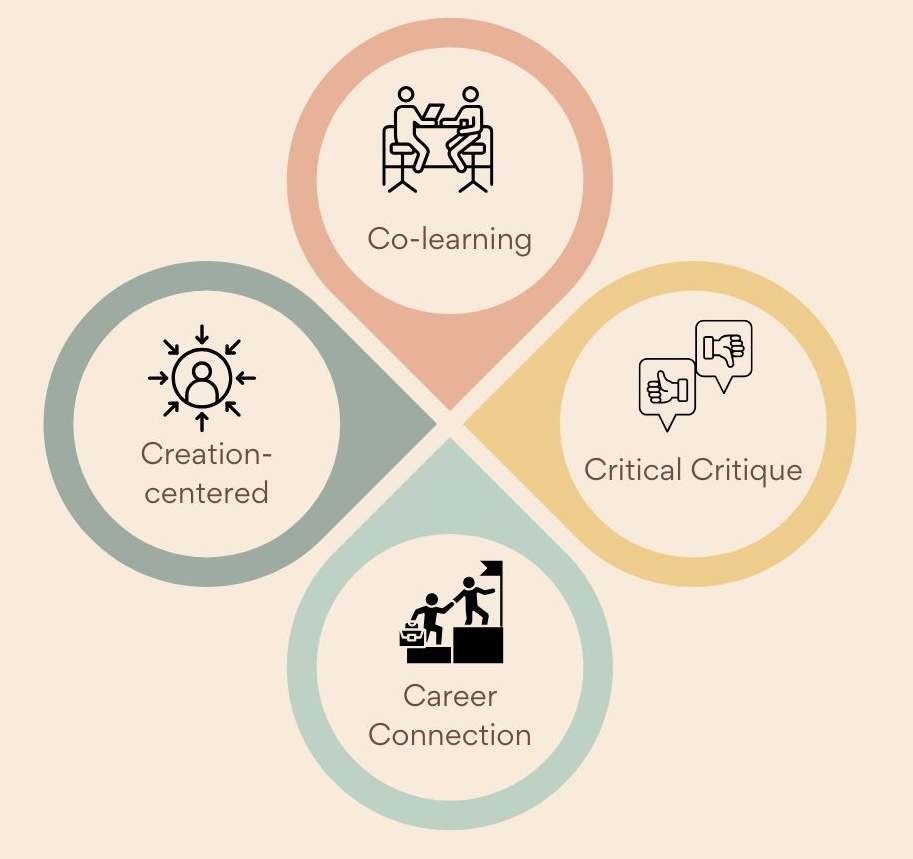Profiles of our adult learners have changed dramatically, not at the exponential growth of technology but enough to shift our learning environments. Generation Z’s (Zoomers) needs and requirements for online learning have transformed and require a new approach.
Emerging adult learners need to be nurtured and led with their experience in mind. These learners want equity, inclusion, and agency, but require modeling and mentoring simultaneously—this means short and long-term goals must be nurtured together. Training of any kind should be human-centered, embracing each person for where they are in their learning journey.
We can support Zoomers in AI-centered spaces by integrating co-learning, creation-centered learning, critical critique skills, and career connections. These new Cs for a generative era consider the updated science, rate of maturity, and adolescent experience that is bridging them into adulthood.
Four Essential “C”s to Support Zoomers in Online Spaces

Co-Learning
How do we, as facilitators of learning, co-learn with AI during all stages of instruction? How do our learners “learn” how to ethically and effectively use AI in their growth?
The key to successful AI co-learning lies in teaching learners how to effectively prompt AI, critically evaluate AI-generated content, and utilize AI outputs as starting points for deeper human reflection and discussion. AI should become a collaborative partner in the learning process rather than a replacement for human instruction. Explore this Co-learning with AI road map for yourself and with your Zoomers to learn with AI as a study partner, assistant, or brainstorm companion, while keeping the mentoring and modeling in line with human needs.
Creation-Centered Learning
How can we use AI to design creation-centered learning experiences? How can our learners ethically use AI to demonstrate creativity and innovation in their learning?
This approach recognizes that Zoomers no longer want to be passive consumers of information—they want to create, share, and contribute to the knowledge ecosystem. We must emphasize the development of copyright-appropriate original content to capture the essence of human contribution. In online learning environments, this translates to designing experiences by exploring AI tools where learners produce podcasts, videos, interactive presentations, digital portfolios, and multimedia projects that demonstrate their understanding (via assessment).
Critical Critique Skills
How can we carefully examine outputs for bias, hallucinations, and validity? How can we model this critical critique for our learners?
In an era of information abundance and AI-generated content, the ability to critically evaluate information has become crucial. Critical critique skills are beyond simply critiquing (which can be biased and neutral); we must teach learners to analyze, evaluate, and synthesize information from AI-generated content and peer-reviewed sources. We need to expand the skill base of Zoomers beyond generic appraisals of online content to guided frameworks such as FLUF to test Generative AI. This increases evidence-based evaluation of online resources and provides a transferable, real-world skill to add to their lifelong tool kit. As facilitators, we can develop critical critique skills by creating structured opportunities for our learners to develop frameworks for asking probing questions and analyzing results.
Career Connections
How do we think about using AI in connection with our own careers? How do we guide our learners to explore careers to see the potential alignment in future pathways with changing AI?
Workforce value increases by empowering our learners with the first three Cs by increasing risk-taking, taking ownership of their educational journey, and building confidence in necessary transferable skills. This, along with developing essential digital/AI literacy skills, is intended to serve them throughout their careers. We can use iterative thinking cycles of critique, writing, and feedback with AI software to increase problem-solving approaches and explore career pathways. This increases their abilities to navigate generative technologies for advanced thinking and creation. Career-centric applications should model authentic AI use cases as seen in business and industry.
Next Steps
We don’t presume we or any of us are experts in this area yet. There are limitless possibilities (changing daily) of how we might utilize AI for adult learners as we all navigate the intricacies of working with learners of all ages and experiences. Facilitating online should respect previous learning and integrate intentional design that recognizes the unique needs and strengths of our Zoomer adult learners.
By embracing these updated four essential strategies, we maintain the human connections that make learning meaningful and transformative. Implementing AI co-learning, creation-centered approaches, critical critique skills, and career connections can create online learning environments that truly serve the needs of today’s adult learners while preparing them for tomorrow’s challenges.
Let us continue to ask: How can we support Zoomers in AI-centered spaces by integrating co-learning, creation-centered learning, critical critique skills, and career connections?
Connect With the Authors on LinkedIn
Dr. Stefani Boutelie: www.linkedin.com/in/stefani-boutelier-phd
Dr. Jennifer Parker: www.linkedin.com/in/dr-jennifer-parker-36960b10
Dr. Madeline Craig: www.linkedin.com/in/craigmadeline





